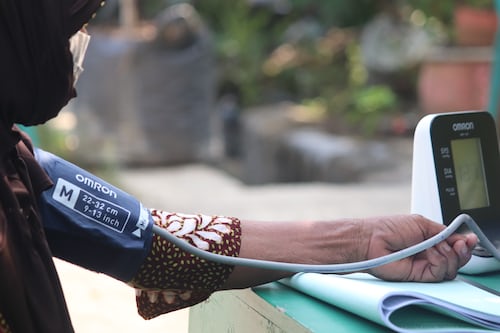The #1 Rated Blood Sugar Formula
For Even Mild Hypertension, Lowering Your Blood Pressure Could Save Your Life

If your blood pressure is between 140/90 and 159/99, you have stage 1 hypertension and need treatment. Stage 2 hypertension is 160/100 or higher. And if your blood pressure is higher than 180/110, you need emergency care.
What Is the Ideal Blood Pressure?
According to the American Heart Association (AHA), the ideal blood pressure for most adults is less than 120/80.
The first number, 120, is the systolic pressure. That is the pressure of blood in your arteries when your heart beats, or contracts, to push blood throughout your body. The second number, 80, is the diastolic pressure. That is the pressure in your arteries between beats.
If your blood pressure is between 120/80 and 139/89, the AHA says you have prehypertension. It’s time to take steps like getting more exercise and eating a healthier diet to bring your blood pressure down.
If your blood pressure is between 140/90 and 159/99, you have stage 1 hypertension and need treatment. Stage 2 hypertension is 160/100 or higher. And if your blood pressure is higher than 180/110, you need emergency care.
Doctors have long known that treating people with a blood pressure of 160/100 or higher reduces their risk of death. But they haven’t been entirely sure that the same is true for people with stage 1 hypertension.
A review of many trials, called a meta-analysis, found that using medications to lower blood pressure in people with stage 1 hypertension significantly reduced their risk of cardiovascular disease and death. The article was written by Dr. Johan Sundström, Ph.D., of Uppsala University in Sweden.
“High blood pressure is the most important risk factor for premature death,” Sundström wrote. “Blood pressure lowering therapy is likely to prevent stroke and death in patients with uncomplicated grade 1 hypertension.”
Most drugs to lower blood pressure fall into one of three classes: angiotensin-converting enzyme (ACE) inhibitors, calcium-channel blockers, or diuretics. The three drugs types work differently to reduce blood pressure.
The study found that it is more important to get your blood pressure down than which drug you use to get it there.
A separate study, also published in the Annals of Internal Medicine, looked at various ways to measure blood pressure. Researchers found that ambulatory blood pressure monitoring (ABPM), which involves taking several blood pressure readings over a period of time, is a good way to confirm hypertension measured in a doctor’s office.
Many people have higher blood pressure when they go to a medical office, a condition called isolated clinic hypertension, or white coat hypertension.
“Elevated blood pressure measured by office-based methods is best confirmed by ABPM … to avoid potential over diagnosis of isolated clinic hypertension and the potential harms of unnecessary treatment,” wrote study author Margaret Piper, Ph.D., of the Kaiser Permanente Center for Health Research, Portland, Oregon. “We also found that home blood pressure monitoring predicted cardiovascular outcomes in a pattern similar to that of ABPM.”
The study authors concluded that it is important to check your blood pressure regularly. And if one measurement in your doctor’s office says hypertension, use a second method to confirm it.
There is no cure for high blood pressure. But treatment can lower blood pressure that is too high. If it is mild, high blood pressure may sometimes be brought under control by making changes to a healthier lifestyle.






